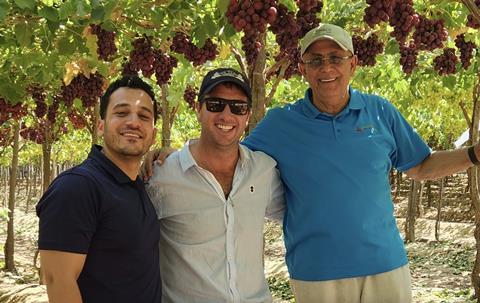Growers should never isolate themselves from other growers around the world and must cooperate to survive
Long-standing relations between growers around the world have always been at the heart of fruit production.

Producers, logistics operators, shipping companies, retailers, breeders and governments need to know what is happening on the other side of the world, and the success of their businesses and organisations depend on this.
As an example, the special relationships that grape growers in Egypt and South Africa have developed over the years are bringing benefits to growers at the top and bottom of Africa.
This relationship has again been demonstrated by very productive exchanges between the growers of these two grape powerhouses in Africa. When it is winter in South Africa, producers head north to where Egyptian growers are harvesting their new crops.
It is nothing new for South African growers to join hands with growers in other producing countries of the world.
Even during the 1990s, South Africans travelled the world to look at new methods of production and exchange information with counterparts.
Legendary growers such as Martin van Niekerk from Vredendal and the late Aat Hoekstra from Paarl annually ‘hit the road’ to broaden their knowledge.
The aim was not only to learn about different production practices, but also to seek out new varieties they could invest in to secure their long-term survival.
This winter, growers and cultivar manager in South Africa are also visiting breeders in the US, in a quest to find the best they can grow in their vineyards.
The way in which growers are now exposed to new varieties has changed significantly, with high-powered new cultivar companies entering the arena, but the problems of adapting to growing conditions, and learning from each other’s experiences, still remain.
The relationship between Egyptian and South African grape growers is therefore an interesting one that benefits both parties.
“For the most part of our season, we are not in competition with growers from Egypt in world markets,” said Gabriël and Reynecke Viljoen, the current generation of a long lineage of grape growers of the farm De Vlei in the Hex River Valley. “They are therefore not our direct competition, but rather a continuation of our season.
“For both of us it is key to our decisions in making selections to find varieties that perform consistently in various production areas around the world to ensure continued supply and consistent quality and eating experiences to consumers.
”It is therefore important to take hands, and to learn from each other, to achieve this and to ultimately increase the market share of table grapes,” they continued.
“Egypt also sends their grapes to South Africa at the end of our season and helping our retailers to fill their shelves.”
One of the South African retailers that normally offer Egyptian grapes during June and July is Woolworths, which is also a leader in developing iconic brands through its outlets.
The Woolworths ’Flavour Burst’ brand endorsement has been recognised as one of the visionary fresh produce brand developments in South Africa.
Well-known Woolworths fruit technologist Frans Gelderblom also annually travels the world in search of new cultivars that could enhance the Woolworths offer to consumers.
“For us it is important to have consistency of taste, quality and eating experience throughout the year, and hence we have to travel to remain at the head of the pack,” he noted.
Representatives of international plant breeding programmes act as a valuable link between growers of different production countries and areas.
Georgios Bitsakos, head of brand marketing for Grapa Varieties, was one of those the two Viljoen brothers encountered on the road. He said they were pleased that new Arra varieties in Egypt are a direct continuation of the very successful long-standing Early Sweet variety.
“These varieties are gaining popularity due to their adaptability to the local climate and soil, their earliness, grower-friendly characteristics, and market preference for their quality and supply window,” he said. ”Currently the most widespread Arra varieties in Egypt are Arra Sugar Drop and Arra Passion Fire.
They also encountered De Witt Kampfer, technical manager, table grapes - Africa and Middle East at Bloomfresh in Egypt.
He is of the opinion that the way Egyptian growers farm is very similar to what is found in South Africa.
“They have similar varieties, and they have a good climate with slightly higher humidity to produce table grapes and get a nice berry size.”
While both South African and Egyptian growers pay a lot of attention to detail, Egypt has the advantage of being close to its key markets.
So, South African growers of citrus, apples and pears, stonefruit, even cherries and berries, are also constantly viewing new varieties during the counter-seasons in other parts of the world.
In the process they develop special relations in the global brotherhood of fruit growers.



